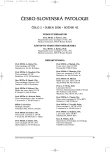-
Medical journals
- Career
Inverse Correlation between HLA-DR Antigen Expression and CD4 Positive Lymphocytic Populations in Normal Mucosa, Tubulovillous Adenoma, and Invasive Carcinoma of the Colon
Authors: D. Tamiolakis 1; I. Venizelos 2
Authors‘ workplace: Department of Cytology, General Hospital of Alexandroupolis, Greece 1; Department of Pathology, Ippokration Hospital of Salonica, Greece 2
Published in: Čes.-slov. Patol., 42, 2006, No. 2, p. 52-58
Category:
Overview
Background:
HLA-A,B,C and HLA-D molecules present antigenic peptides to the antigen-specific receptor of autologous T lymphocytes. T-cell-mediated host-versus-tumor response might therefore depend on the presence of these molecules on tumor cells, although the absence of HLA-A,B,C determinants on a cell has been shown to increase its susceptibility to lysis by natural killer cells. The prognostic role of tumor stage and grade is well - established in colorectal cancer. In this study we used immunohistochemistry to analyse the expression of HLA-DR on epithelial cells of normal colonic mucosa, tubulovillous adenoma, and invasive carcinoma, as well as the magnitude of the stromal T lymphocytes at the relevant sites. HLA-DR expression was correlated to histological grade and Dukes stage in the cases of invasive cancer. Yet, we investigated the association of HLADR plus DQ genes and adenoma or carcinoma by PCR.Materials and methods:
31 cases of normal colonic mucosa, 12 cases of tubulovillous adenoma, and 39 cases of invasive carcinoma were surveyed for the detection of HLA-DR monoclonal antigen, and the T helper (TH) marker (CD4) in the stroma (lamina propria) of the relevant cases.Results:
HLA-DR was expressed in 20 of 31 normal colonic mucosas (64.5%), 4 of 12 adenomas (33.3%), and in 10 of 39 invasive carcinomas (25.6%). A strong relation of HLA-DR expression and histological grade was found (p<0.001), but no association with Dukes stage (p=0.141). No significant correlation between HLA-DR plus DQ genes and adenoma or cancer of the colon was found. CD4 positive cells were found in 9 of 31 normal colonic mucosas (29%), 5 of 12 adenomas (42%), and in 26 of 39 invasive carcinomas (67%).Conclusions:
The results showed an inverse correlation between the expression of HLA-DR and the number of CD4 positive cells as the lesion progressed to malignancy. HLA-DR was significantly associated with tumor grade but not with Dukes stage in colonic cancer hosts. HLA-DR and DQ genes do not contribute to a susceptibility to adenoma or carcinoma.Key words:
HLA-DR – CD4 – normal colonic mucosa – colonic adenomas – invasive carcinoma of the colon nádoru (p < 0,001), nikoli ale vztah ke stadiu dle Dukese (p = 0,141). Nebyl zjištěn signifikantní vztah mezi geny HLA-DR a-DQ a adenomem či karcinomem. CD4 pozitivní buňky byly nalezeny v 9 z 31 normálních sliznic (29 %), v 5 z 12 adenomů (42 %) a ve 26 z 39 invazivních karcinomů (67 %).
Tyto výsledky ukazují na inverzní vztah mezi expresí HLA-DR a počtem CD4 – pozitivních buněk v průběhu malignizace léze. HLA-DR má významný vztah ke grade, ne však k Dukesovu stadiu. Geny HLA-DR a -DQ nepřispívají k predispozici k adenomu či ke karcinomu.Klíčová slova:
HLA-DR – CD4 – normální sliznice tlustého střeva – adenomy tlustého střeva – invazivní karcinom tlustého střeva
Labels
Anatomical pathology Forensic medical examiner Toxicology
Article was published inCzecho-Slovak Pathology

2006 Issue 2-
All articles in this issue
- Dedifferentiated Mixed Stromal-Smooth Muscle Tumor of the Uterus. Report of a Case
- Epithelioid Hemangioma of the Foot
- Tumoriform Endometriosis of the Urinary Bladder in Advanced Pregnancy
- Inverse Correlation between HLA-DR Antigen Expression and CD4 Positive Lymphocytic Populations in Normal Mucosa, Tubulovillous Adenoma, and Invasive Carcinoma of the Colon
- Diagnostic Procedures in Skin Adnexal Tumours From histogenetic, morphologic and immunohistochemical point
- Argyrophilic Grain Disease: Case Report of the First Two Cases in the Czech Republic and Review of the Literature
- Mammary Carcinoma with Osteoclast-like Giant Cells – Report of Two Cases
- The Subacute Angiohypertrophic Myelomalacia Foix-Alajouanine – a Rare Disease?
- Czecho-Slovak Pathology
- Journal archive
- Current issue
- Online only
- About the journal
Most read in this issue- Argyrophilic Grain Disease: Case Report of the First Two Cases in the Czech Republic and Review of the Literature
- Tumoriform Endometriosis of the Urinary Bladder in Advanced Pregnancy
- Dedifferentiated Mixed Stromal-Smooth Muscle Tumor of the Uterus. Report of a Case
- Epithelioid Hemangioma of the Foot
Login#ADS_BOTTOM_SCRIPTS#Forgotten passwordEnter the email address that you registered with. We will send you instructions on how to set a new password.
- Career

